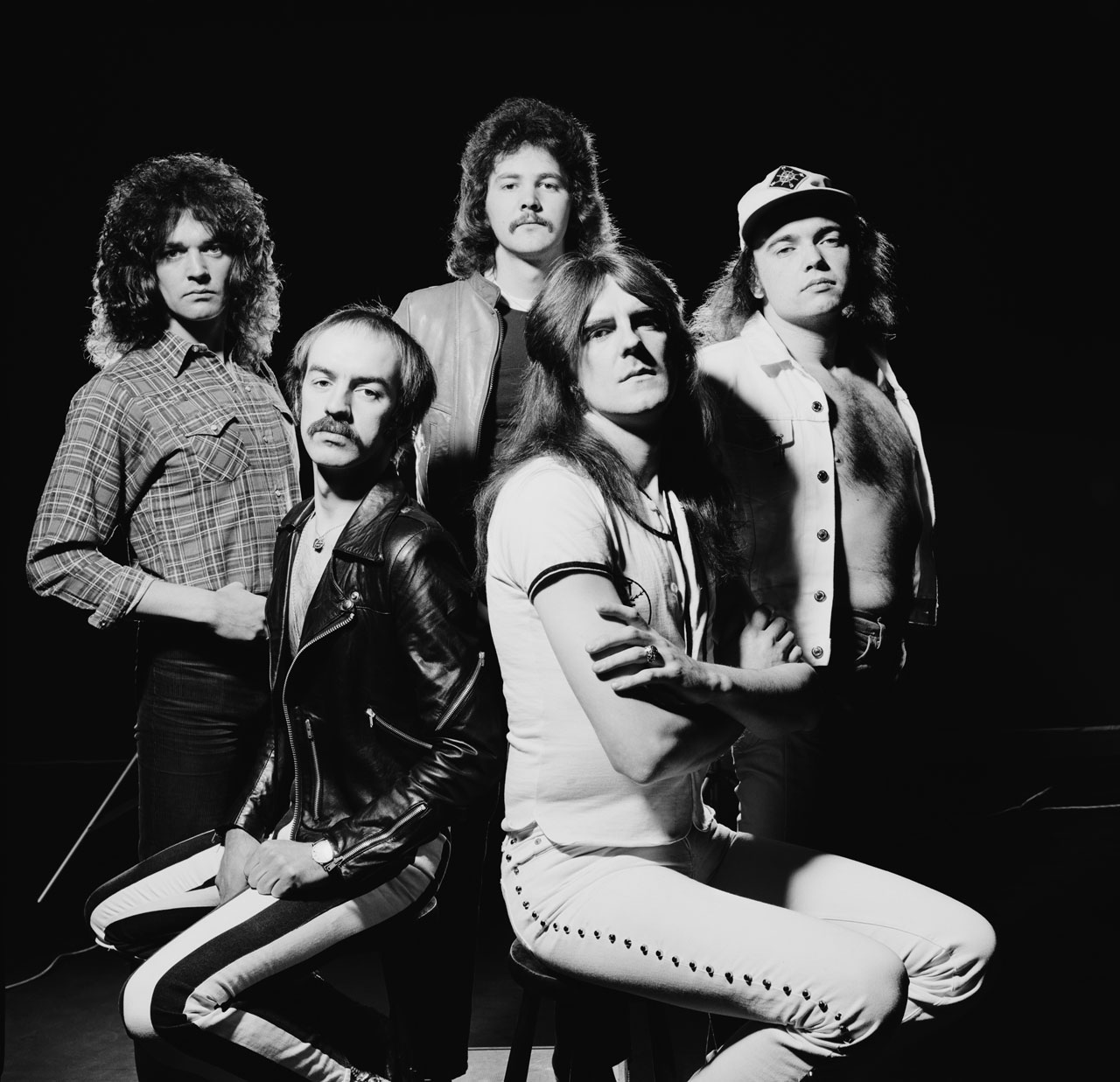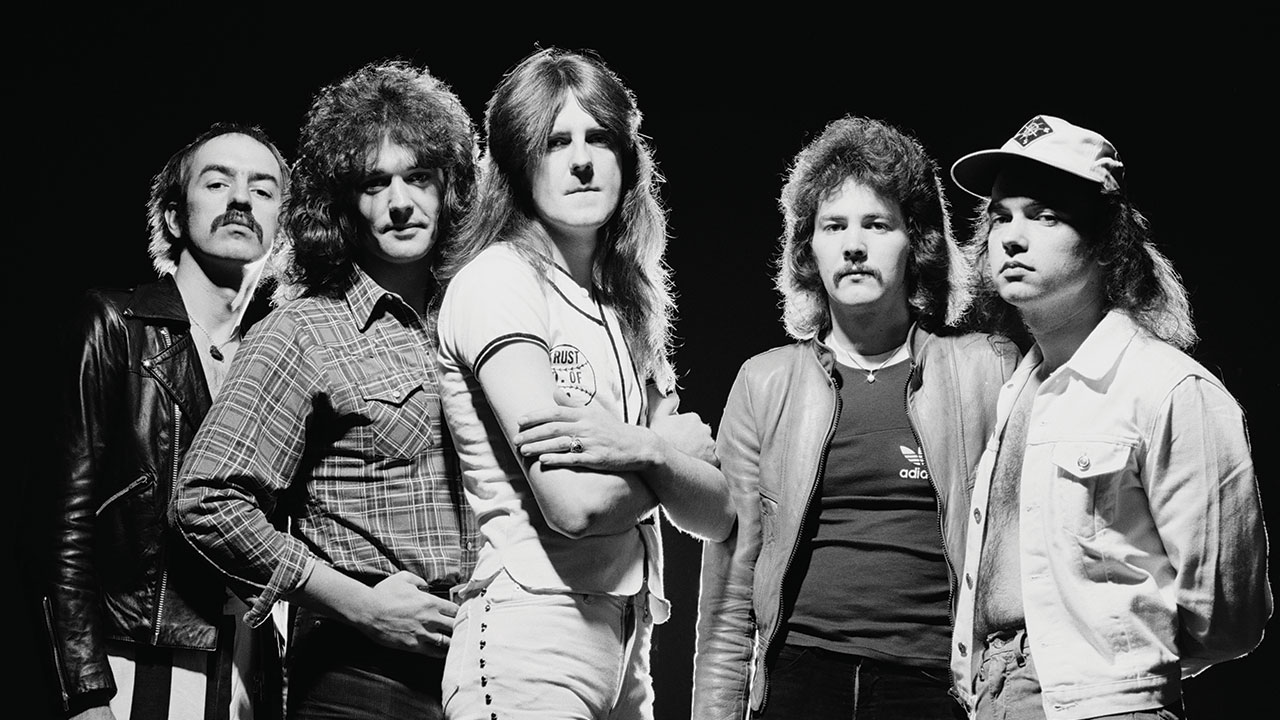The Great Northeast Blackout took place on November 9, 1965. Due to disastrous technical problems, electricity supplies to thousands of people in southern Ontario, Canada, and across eight north-eastern American states, were abruptly cut. Alarmingly, this included power supplies to airport runway lights, forcing countless planes to be re-routed elsewhere.
The blackout lasted for 13 hours: seemingly against the odds, the crime rate reportedly dropped as a result. Less surprisingly, birth rates in the areas affected unexpectedly spiked nine months later…
Fast-forward to 1979: Saxon frontman Biff Byford is watching a BBC documentary about the blackout, presented by noted science historian James Burke, and suddenly has a really cool idea for a song. Within a matter of days, Saxon had written 747 (Strangers In The Night), which would soon become one of the band’s biggest hits and greatest anthems.
“I was watching this documentary and somehow it all just went in, you know?” Biff recalls. “I’d heard another song with a lyric about ‘riding on a 747’ and that was stuck in my head, and it all seemed to come together naturally.
"I came up with the melody for the chorus first. I think I wrote that arpeggio in the chorus with the words ‘Strangers in the night’ in there. I probably got the idea from the [1966] Frank Sinatra song – the syllables were the same. I’m a big Sinatra fan. I like his phrasing. So when that riff came along, it all fitted together really nicely.”

Saxon released their self-titled debut album in May 1979, to no great acclaim but plenty of encouraging ripples of enthusiasm from a steadily growing UK heavy metal scene. Less than a year later, Saxon would record Wheels Of Steel, their now-classic second album and one of the New Wave Of British Heavy Metal’s unimpeachable benchmarks.
A relentless barrage of riff-driven classics, Wheels Of Steel was the moment when Saxon cemented their identity as masters of thunderous shout-alongs like Motorcycle Man and Wheels Of Steel and more overtly melodic hard rock fare like 747 (Strangers In The Night).
“The first album was an amalgamation of our earlier bands joining together and everyone writing songs as a team,” says Biff. “Things like Stallions Of The Highway and Backs To The Wall, the more frantic things, they were written together as a band. There were a few that me and Paul [Quinn, Saxon guitarist] had that were a little more proggy and lyrically a bit deeper, and a couple that the other guys had that were more bluesy, a more 70s vibe.
"But Wheels Of Steel was definitely an 80s album, without a doubt. We had no sense of destiny or anything, but we knew we had some great songs. We knew we’d done something great, but we didn’t know we’d written a defining album for that era.”
In truth, 1980 was a crucial year for metal, as Wheels Of Steel shared shelf- space with Ace Of Spades, Back In Black, Heaven And Hell, Iron Maiden, Blizzard Of Ozz and British Steel, to name but a few seminal records released within those 12 months.
But even among such commanding company, 747 (Strangers In The Night) stood out as an unexpectedly subtle and affecting piece of songcraft, one that offered something distinctly different from the burgeoning metal scene’s usual lyrical preoccupations of fantasy, horror and partying.
“I must admit there was a lot of street fighting and girls in our lyrics, for sure,” Biff chuckles. “But 747 was always a melancholy song. It had to be. I just had this image of the power cut as you’re coming in to land, and the airport lights blink out. These planes were being diverted elsewhere and the city’s in darkness. I thought that was a powerful idea.
"I also thought it was quite cool that strangers were meeting in the blackout. They say that there was a baby boom nine months later. A lot of people became friends through it, shall we say! Ha ha ha! I imagine there was a lot of looting, too. So I just put the two together, really. Some parts of the lyrics don’t make sense logistically, I know, but it just came together that way. It was a moment of magic.”
As any Maiden fan will tell you, aviation is a pretty great subject for heavy metal songs, but Biff cheerfully admits that he’s never had any serious plans to fly a plane himself.
“I never liked flying. I was always a nervous flyer,” he notes. “I still don’t like it but I’ve got used to it now. It always used to affect my ears really badly, especially if I sang on the day we flew into somewhere. I’d find I was singing in the wrong key. But I’m OK with it. I’ve flown on a lot of 747s, put it that way. Ha!”

Preceded by the single release of its iconic title track two months earlier, Wheels Of Steel was released in May 1980 and became an instant hit, reaching No.5 in the UK album charts and proving a similar success story across Europe.
The album’s popularity was plainly helped by the fact that the proudly radio-friendly 747 (Strangers In The Night) was released as a single in June and rocketed up the UK charts, peaking just outside the Top 10 and earning Saxon a second invitation to appear on legendary TV show Top Of The Pops. Unfortunately, things didn’t quite work out.
“We never did Top Of The Pops for that song because the BBC went on strike!” Biff laughs, ruefully. “It probably would have got a lot higher in the charts if we’d done it. We were looking at the Top 5, to be honest, but then the cameramen went on strike. Top Of The Pops was like the British MTV. If you did it, you crossed over quite a bit.
"With a song like 747, it really could cross over because it’s not brutal, is it? It’s a melodic metal song. But we did it with Wheels Of Steel and a few other songs, and it was good to be in there with everything else.
"You have to remember that the New Romantic thing was happening at the same time, so when we did do Top Of The Pops, it would be me, Lemmy and Rob Halford and then Spandau Ballet and Duran Duran and a couple of punk bands. It was a wacky time, a big melting pot of music.”
Despite being denied the chance to arse about in front of the TOTP cameras, Saxon were bona fide pop stars by the time 1980 turned into 1981. 747 (Strangers In The Night) eventually peaked at No.13 in the singles charts: a major achievement for a heavy metal band in any era. More importantly, it was enthusiastically embraced by Saxon’s fans and has long since been regarded as one of the defining metal songs of the 80s.
“Melodically, we made a real statement with that song,” says Biff. “It was the biggest song from the album that went mega and it helped to make us even bigger. But 1980 was an extraordinary year for songwriting in general, I think. You had Motörhead and Whitesnake and Priest, who were all already massively established, and then these new bands like us and Maiden were thrown in, too.
"Suddenly we’re all on the radio and TV all the time, and not just in the UK but across Europe. Honestly, I can tell you that a lot of American bands were listening to what was happening and getting influenced by it.”
Four decades on, Saxon are celebrating their 40th anniversary, focusing on material from the band’s first few classic records. And yes, they will be performing 747 (Strangers In The Night) every night, as they have done at nearly every Saxon show since those chart-bothering days in the early 80s.
“It might be hard to believe, but we have dropped it from the set a couple of times,” Biff concludes. “If we do a short setlist, it sometimes gets lost, but it’s such a big song around the world. It would be unfair to audiences if we didn’t play 747. I’m not one to say ‘I’m never playing it again!’ about something like that. I still like that song and I still get off on the audience loving it. That’s what we’re all there for, isn’t it?”

